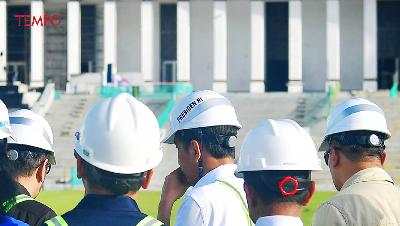The Trick with Public Housing Savings
Monday, June 10, 2024
The Public Housing Savings program will only burden workers and companies. It is a way for the government to evade its responsibility to provide people’s housing.
arsip tempo : 174644938073.

PRESIDENT Joko Widodo has no choice other than canceling the Public Housing Savings or Tapera program. This forced savings program will only harm public interests and offer loopholes for corruption by its managing body.
Jokowi issued Government Regulation No. 21/2024 on Tapera, which among others stipulates that this program will take effect in 2027. Through Tapera, the government wants to set up a ‘funding pool’ sourced from all workers’ contributions. Private workers, employees of state enterprises, members of the state apparatus as well as expatriate workers are required to transfer 2.5 percent of their income. Companies add a portion to the sum so that the fund accumulated is equal to 3 percent of workers’ income.
According to the government, the Tapera fund will be used to finance the provision of housing for people with low income. In the latest regulation, only Tapera participants with a maximum salary of Rp8 million, and Rp10 million in Papua, are eligible for the benefit to receive housing credit subsidy. Meanwhile, workers who earn more than the limits will only have the status of ‘noble depositors,’ who are promised certain yields upon their retirement.
In view of the scheme, Tapera is none other than a system of forced savings wrapped in social insurance. Workers with high salaries have to make up for the funding of low-income manual workers’ housing. At first glance, it looks like an ideal mutual assistance program, with ‘the big’ helping ‘the small.’
The problem is that this method is unfair because the value of income does not reflect the fulfillment of living needs. It may be that workers earning less than Rp8 million already own houses and conversely, employees with a salary of over Rp8 million have no houses of their own.
The other issue is the attempt to transfer the responsibility to provide low-cost housing from the government to the public through the accumulation of the Tapera fund. In Government Regulation No. 21/2024, which is actually a revision of Government Regulation No. 25/2020, the government has included an addition to article 64, stipulating that the state budget disbursed through the Housing Funding Liquidity Facility or FLPP can be terminated when the Tapera Management Agency is already in full operation.
It means that through this regulation, Jokowi is trying to remove the budget for low-income people’s housing from the list of government expenditure in phases. It should be suspected that this constitutes an attempt to transfer the housing development budget to other items of more preferable expenditure, such as the construction of the new capital city or populist programs to be undertaken by the new government.
In fact, Law No. 1/2011 on Housing and Residential Areas stipulates that the state shall be responsible for the provision of decent housing for society. The rule also requires the government to assume its role in providing housing subsidy. With this new Tapera provisions, the government practically betrays its obligation if the responsibility for providing people’s housing is shifted to public funds.
The other loophole lies in Tapera fund management itself. Weak law enforcement and financial monitoring made manipulation in the investment fund placement is wide open. There is plenty of room for crooks to embezzle this program’s fund. If this happens, all workers’ hopes to own low-cost houses will be all gone.











